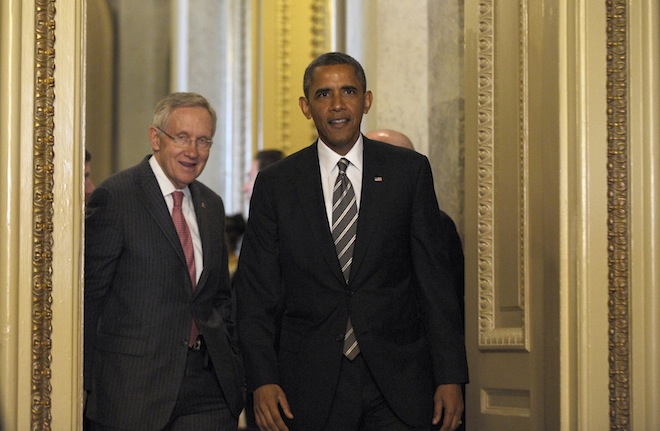Senate Majority Leader Harry Reid (D-NV) called the interm nuclear agreement with Iran “an important first step” but remained noncommittal on whether the Democratic-led chamber would impose tougher sanctions on the regime, which might get in the way of the deal.
“The way that I feel about it today is the same way that I felt about it last week,” he told WAMU’s “The Diane Rehm Show” in an interview Monday. “I said when we come back we’ll take a look at this to see if we need stronger sanctions.”
The sanctions could be included in the National Defense Authorization Act (NDAA), which is pending on the floor while the Senate takes a two-week recess. Reid said he’d look to Banking Committee Chair Tim Johnson (D-SD) and Foreign Relations Committee Chair Bob Menendez (D-NJ), who have jurisdiction over the issue, to consider the path forward.
“They will do what they’re supposed to do. They’ll study this. They’ll hold hearings, if necessary,” said the Democratic leader. “And if we need more work on this — [if] we need to do stronger sanctions, I’m sure we’ll do that. And so I look forward to input from both the majority and minority when I get back there, and we’ll move forward appropriately.”
It’s a tricky issue because the six-month deal announced Saturday night — struck between Iran, the U.S. and five other global powers — would freeze core components Iran’s nuclear program in exchange for lifting some $7 billion in economic sanctions. President Barack Obama is believed to have the authority to ease the sanctions on his own. But some senators want tougher sanctions regardless, which could theoretically impede the deal.
If the Senate did enact tougher sanctions, could Obama potentially veto them?
“Of course, yes,” Reid said.
The Nevada senator said he has spoken to Israeli Prime Minister Benjamin Netanyahu about the matter and understands his concerns with the interm agreement.
“At least, for the first time in some 37 years, the United States, the European Community plus China, Russia, France, Great Britain — we’re all able to talk to Iran, for the first time in 37 years,” Reid said. “So it’s an important first step. If it’s a good enough first step — we’ll take a look at that.”






